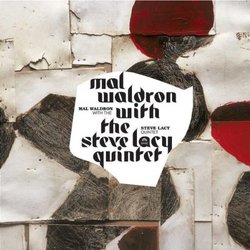| All Artists: Mal Waldron, Steve Lacy Title: Mal Waldron With the Steve Lacy Quintet Members Wishing: 2 Total Copies: 0 Label: Verve Release Date: 3/15/2005 Album Type: Import, Limited Edition, Original recording remastered Genres: Jazz, Pop Styles: Modern Postbebop, Bebop Number of Discs: 1 SwapaCD Credits: 1 UPC: 044006786223 |
Search - Mal Waldron, Steve Lacy :: Mal Waldron With the Steve Lacy Quintet
 | Mal Waldron, Steve Lacy Mal Waldron With the Steve Lacy Quintet Genres: Jazz, Pop
|
Larger Image |
CD Details |
CD ReviewsJazz at its horizon-stretching best Bert vanC Bailey | Ottawa, Canada | 06/14/2007 (5 out of 5 stars) "I wouldn't call this a good place to start with Lacy. In fact, I disliked this CD at first, feeling it was an earload of bloodless music, lacking propulsion or guts: no bounce, no balls.
I came to Lacy through his work with Thelonious Monk, his 'Soprano Sax', 'The Straight Horn of...', and `The Spirit of Mingus.' I then fell hard for his `Monk's Dream,' with Roswell Rudd, and `I Remember Thelonious', also with Mal Waldron. More conventional, melodically-gifted albums, unlike this quintet with Waldron - whose piano I hadn't paid much attention to on my Coltrane and Dolphy albums. By the second or third spin, though, an eerie seduction began: the speed seemed to gather and the apparent chaos retreated, and what took shape was not cold nor austere. The randomness was replaced by a manic ensemble with unexpected jabs and splashy crashes - certainly enough to get my attention, to anticipate pulses, fill in beats, and grasp a unity within the disharmony. The textures were all thick, the tempos hasty, and the sounds fit into themes that eventually charged towards a hard climax, followed by a spacey unfolding. With ears now cleared, `Vio', the insistent opening work, turned out to be an eerie 18-minute piece of no minor magnificence. Ditto for the rest of this album. All five numbers - three, really, plus two alternate takes - flirt with post-bop, funk and mid-eastern modalities, and gel intriguingly without any clear core - nothing as clear as, say, on Dolphy's `Out to Lunch.' Waldron's playing often provides a kind of musical glue, and sometimes the cello of Irene Aebi (Lacy's wife) is the hub that the players orbit. Waldron's quirky piano hiccups and spasms vaguely recall Monk, `though his instrument runs as often in smooth synchrony with the tenor sax, cello, double bass, and drums. This, in sum, may take patience but amounts to nearly 60 minutes of delightful free jazz at its horizon-stretching best. Its every bit as fresh and free of clichés today as on its 1972 recording date. If Coltrane's 'Ascension' and 'The Father and The Son and The Holy Ghost' draw you in, if you don't find most current jazz compelling yet are intrigued, as an Anthony Braxton title put it so well, by 'What's New in the Tradition', well, this disc is likely to seduce you, too." |

 Track Listings (5) - Disc #1
Track Listings (5) - Disc #1